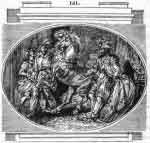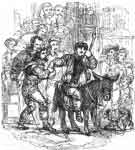A Horse brought the Emperor safe out of battle. The Emperor created a magnificent stable for the Horse which could not have cared less.
Happiness beyond the limits which nature has prescribed is an illusion.

Northcote
The Horse of a Turkish Emperor had brought him safe out of a field of battle, and from the pursuit of a victorious enemy. As a reward for such good and faithful service, his master built him a stable of marble, shod him with gold, fed him in an ivory manger, and made him a rack of silver. He annexed to the stable several fields and meadows, lakes and running streams; at the same time he provided for him a seraglio of mares, the most beautiful that could be found in the whole Ottoman empire. To these were added a suitable train of domestics, consisting of grooms, farriers, rubbers, &c. accommodated with proper liveries and pensions. In short, nothing was omitted that seemed likely to contribute to the ease and happiness of his life, who had preserved the Emperor’s. But, after all, the horse was totally insensible to all this magnificence, and was only able to enjoy that small portion of good which administered pleasure to his natural appetites and an alleviation of his natural wants: all else was wholly thrown away upon him and lost; nay worse, as by it he became indolent, and of consequence diseased, and instead of being an increase of his happiness, it became the cause of his misery.
Application
In the foregoing instance is shown the folly of endeavouring to bestow happiness beyond the limits which nature has prescribed.
It is precisely the same thing with all these splendid superfluities which surround human greatness, and which we survey at a distance frequently with envy, and lament our privation of them; while to the great who possess them, they are in a manner lost, becoming stale and insipid, and recognized only by the trouble that is attached to them. Our natural wants are few, and by means of industry may always be supplied; all else are artificial wants, generated by idleness, pride, or folly, and commonly attended by more cost than profit, more trouble than pleasure.
Nothing is more dangerous to our true happiness and tranquility, than to fix our minds upon any thing which is in the power of fortune. Wealth, glory, and power, which the ordinary people look up to with admiration, the learned and the wise know to be only so many snares laid to enslave them. There is nothing farther to be sought for with earnestness than what will clothe and feed us. If we pamper ourselves in our diet, or give a loose to our imaginations and desires, the body will no longer obey the mind. Let us think no further than to defend ourselves against hunger, thirst, and cold. We are to remember that every thing else is despicable, and not worth our care. To want little is true grandeur, and very few things are great to a great mind. Those who form their thoughts in this manner, and abstract themselves from the world, are out of the way of fortune, and can look with contempt both on her favours and her frowns. To be perfectly free from the insults of fortune, we should learn that none but intellectual possessions are what we can properly call our own. All things from without are but borrowed. What fortune can give us is not ours; and whatever she gives she can take away.
Tatler.

